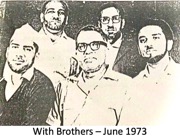
Life Experiences
Ahmed Sheriff Dewji
Based on an interview by Muslim Sheriff of Arusha
When I was Hardly Able to Crawl
I was born in the year 1927. They tell me that at the age of 40 days when I was hardly able to crawl, I was brought to Mombasa and was left at my uncle, Mulla Mohamed Jaffer Sheriff’s house while my parents went to Ziarat. In those days, Ziarat would take between 3 to 6 months.
Education During Colonial Days
I returned to Zanzibar later and was educated there. There was nothing like Nursery School. At the age of 4 or 5 years, you would go to a Mulla or Muliani’s house to learn recitation of the Holy Qur’an. You started with the small Qur’an and having finished that you go onto the big Qur’an and when you complete this, there is distribution of halwa or some sweets. After this, one would be admitted to a primary school. The main school where the Asian boys were educated was Sir Ians Smith Madressa primary school. There, the main teachers were either Hindus or Parsis. Then, there were hardly any Muslim teachers.
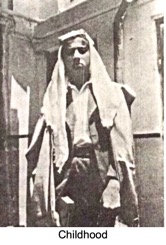
After 7 years, you finish the primary education, if you wish, you could proceed for secondary education in Government school which was situated at Mnazi Moja. There, the principal would be a British teacher who came from England. This was in order that the syllabus of the Government was taken care of and whatever brainwashing or propaganda in favour of the British was to be made and put in the minds of the young students. I remember precisely, that was the period of the World War 2, year 1940-1944. The principal, Mr. Holiswar was very serious and energetic. He would call all the Form 4 students into one classroom during breaktime for 5 to 10 minutes in order to brainwash us, and make us favour the British and be against the Germans and the Italians, their enemies. We were given the latest news and lectures.
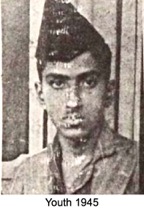
Not only that, the British were interested in indirectly diverting the attention of the upcoming generation from Islam to the Western Civilization, and the British way of looking at things. I remember the principal telling us that we in the West feel that it is beyond your dignity to prostrate or bow down before anybody. One should maintain his pride. He meant that you Muslims bow down and prostrate. This is against your dignity. This is one example of an anti Muslim campaign.
Otherwise, the British system of education which included English, Maths and Physical exercises was very good. Whoever completed this education up to Form 4 would go forward for further education. Then he would fit in the business or office for work rather than begging.
A Long Trip To Ziarat
I remember that when I was about to finish school in 1944, I was taken for a long trip to Ziarat by my elder brother Mohamedbhai. Because of the World War, one could not travel direct. One had to travel to Uganda by train. You could not travel by ship or by air.
At Uganda, after staying with Jamaal Ramji who were our friends, we had to find a military transport to travel all the way on bad roads to Soroti. In Soroti, we stayed a day or two with an Ithnasheri and from there we took another transport on bad roads for a day and overnight to go to Juba.
Juba was a port on River Nile, and we used the river transport to go to Khartoum. That journey was by night steamer, when we used to view hippos and crocodiles on both the banks, took 6 to 7 days till we reached Koski. From Koski by train to Khartoum. Then from Khartoum by train to Wadi-e-Khalfa. From Wadi-e-Khalfa to Shelal again by night steamer for 2 to 3 days. Again from Shelal to Cairo by train. I remember it took us 14 days from Juba to reach Cairo.
At Cairo, we stayed with a friend of our brother, Hamdi Mustafa for 10 days in his house. We visited the Pyramids, Alexandria, Masjide Ra'sal Husein, and after 10 days we took train to go to Jerusalem. This was before Israel was established.
After staying a couple of days in Jerusalem, we took a car to go to Beirut via Tel Aviv and the Mediterranean Coast. From Beirut, we took another transport, one Naran bus, to go to Kazmain, Karbala and Basra. And from Basra we entered Iran.
There were no tarmac roads and no planes. We travelled by train and crossing the Shatt-el-Arab by boat, we went to Khorram Shahar. From Khorram Shahar by train to Qum. The train used to go through tunnels under the mountains to Qum. From Qum, after staying 2 to 3 days, we went to Tehran, from where by road again to Mashed. After staying for a few days in Mashed, then we took a transport to Zahedan. We would sleep or lie down on goods. From Zahedan we took train to go to Karachi.
Sadqa Do, Tum Bach Gaye!
Whilst in Bombay, we had to wait and wait to be able to get vessel to Zanzibar by ship. There was scarcity of ships due to post war situation. In the course of 3 months stay in Bombay at Dewji Jamaal Musaafarkhana, one day at noon we were in a hurry to return home after having made purchases from the Bazaar, the tram was about to leave. I rushed forward to board the tram, when it started to move. I went across to board the tram, and I put my hand on the handle, my hand slipped and I fell down. Having fallen down, I came under the tram. With only my head out, I was dragged by the tram to the distance of 30 metres. The driver of the tram did not know. He was speeding forward. The tram then stopped. I came out and stood. I could not feel the pain immediately. But thereafter, I could see that I had damaged my legs and fingers. I had bruises here and there. The lucky part was that my head was out and that was saved from injuries. The people in Bazaar, seeing me safe, were shouting “Sadka Do, Sadka Do, Tum Bach Gaye”. I was taken in a horse cart to the hospital. There, I had to be treated for 7 days. My legs which were fractured were put under Plaster of Paris. I remember those hard times, sleepless nights in hospital. My legs having been put in plaster, I was finally moved to the Musaafarkhana where I stayed for nearly one month, waiting for passage to Zanzibar.
Back to Zanzibar
Finally having managed to get a seat to go to Zanzibar, it took us another 8 to 10 days to reach Mombasa. We went to Zanzibar by air. At Zanzibar, the people were surprised that howcome the people had no prior knowledge of the accident. At the airport, they found that I was limping, and my legs were under plaster. By the time I had arrived back in Zanzibar, six months had passed since we had started the journey. It was already November and I had missed the annual examinations. We decided that I should not repeat the year.
I Join Business
In those days, secondary education was not considered important. What was important was to fit in the business. So from 1946 onwards, all the brothers decided that I join the firm and my first assignment was to type letters. Then they thought that I must gain the experience of a cashier, that involved counting money, writing receipts and balancing out the cash.
In those days, I used to suffer from flu because of my sinus trouble. Once I had overpaid or overcollected which resulted in loss of Shs.100/- whilst my salary was Shs.40/- which included boarding and lodging and mboga and mchicha. So I had somehow to make up for the money from my personal account. I was not excused by the firm. That was the discipline.
They Find TB Germs In Me
I had started reciting Majlises from 1942 when our father had got sick. So he could not continue with majlises in Bustani. The majlis was twice a week and when my father died in 1943 this responsibility was rested on me.
In 1947 I got married. In 1948 I was advised to go to Pangani for recitation of a majlis. Whilst I was in Pangani, I developed symptoms of TB. On return, I developed active TB with fever, perspiration at night and lots of coughing. From the fluid drop of my lungs, they found TB germs. In those days there was no treatment expect for being admitted into a sanatorium. The only sanatorium in East Africa was at Kibongoto, 25 miles from Moshi.
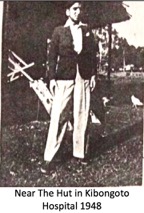
When I joined the firm in 1946, Mohamedbhai and Ebrahimbhai my 2 elder brothers were running the business. I was being trained to learn the routine work of typing, correspondence, as cashier, customs and export. When I got sick, I was taken to Kibongoto where I stayed for 14 months. I recovered very quickly because of young age, good climate, and good food.
Cause Of Opening A New Branch
During that time, in 1949 we were establishing business in Arusha. When I was released from hospital in 1950, I came to Arusha. I was made to join the business of produce export which was being established by late Ebrahim Sheriff. For me, there was no question of deciding, but the question was of compulsory stay in better climate of Arusha for my good health. This became a cause of our opening a branch in Arusha. Whilst I was at Kibongoto, Ebrahimbhai was trying to establish a business in Arusha.
He was doing experiment in beans, buying, selling, and export. When I had recovered, I joined him. I was helping him in expanding the business. Your father (interviewer's father) was trying to establish in Arusha whilst he was taking time to make sure that I recovered fully.
It took 2 to 3 years to recover fully from TB. It was a serious sickness like what is Cancer today. So having established a branch here in Arusha and I having joined, we both became very actively involved as there were opportunities. In 1950, we worked on export of produce to the Far East and to London. I was living alone. It meant 14 months in the cold climate at the foot of Mt. Kilimanjaro, no electricity and no regular transport. If somebody died there, it would have taken 12 to 18 hours for somebody to come and collect his body. But it was a blessing in disguise that the climate there and the food was good. This meant rebuilding the whole body better than Zanzibar.
Secondly, it meant that it was withholding us from returning to Zanzibar by wanting to establish Moshi and Arusha for future generation. So that sickness and all that hardship of having to go to Moshi every fortnight meant we were getting established in Arusha as Branch of Zanzibar. Thereafter, we developed our produce trade depending on labour for handpicking and grading in order to secure the overseas market and in those days we were having labour shortage around Arusha.
The Moshi Branch
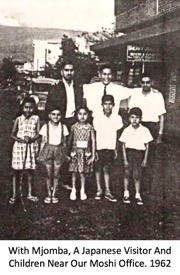
In order to meet our demand, we had to open another branch. That prompted us to open a branch in Moshi in 1952. We decided that I should go to Moshi to take care of that side. By the grace of God, we gradually developed and first built our house in Arusha and thereafter built our godown for produce storage in beans.
In Moshi we hired a godown for 2 to 3 years and thereafter we secured a plot in 1955. Then we built our own godown. I was the manager of the setup there. Because of that freedom of export business during Colonial times; we tried many new lines in export, like small chora (kunde) which was never exported before. When there was a good crop, we would buy 50 to 100 tons. We would export to Italy for sprouting purposes to grow plants which would feed the cattle. That was a new line we developed.
Secondly, we developed the line of buying cattle bones and drying it under the sun. After accumulating 50 to 100 tons we would sell and export to U.K.
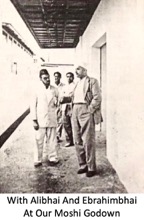
Thirdly, it was rice husk, rice bran and maize bran which was hardly being exported. We opened up a new market in the West. We were exporting large quantities to Belgium, Holland, and UK. I remember one year my performance was so good that I exported 2 to 3 thousand tons in that year. Having submitted the full report of this particular line to the head office, they were happy and gave me a bonus in form of a Haj trip.
Emptying The Buckets
You people are born with silver spoon. In those days there were huts near the present Jamaat khana. We used to live in huts. There was no Jamaat khana. Within our hut one day the toilet collapsed because the only support was the chains. There was no proper concrete down there. It took one week to repair the toilets. The house boy would not assist in emptying the buckets. You know they were fresh garma garam. I would ask the passing Masais. They would reply, "What is the work? Emptying the buckets? How much would you pay me?" 50 cents. He would say no, give me one shilling. That would cost us several shillings over seven days. This was 1949 when I had come from Kibongoto. This building in which we are living was completed in 1951. I stayed for only a few months in the front portion and then moved to Moshi.
Post Uhuru (Independence) Days
We were not only prospering, but enjoying the trade. We established a good name in Arusha and Moshi and also through business, public contact. Then came the time of Post Uhuru, by the government regulation, the price structure, the control and all this meant that gradually we were losing the export trade and it was not becoming viable. In 1967, the government declared the Arusha Declaration, which meant that they were going to take over all the export, import business. We could see that we had no future as exporters.
Coffee Business
During the period of 1952 to 1970, we were also operating coffee business. We were buying in the auction, blending, bulking, packing and exporting mainly to Arab markets in the Gulf, and also to Europe and the USA. We reached a stage when we were the regular exporters.
The Despo Coffee Estate
In 1967, we bought a coffee farm with a view of diversifying from export to farming. We bought a beautiful coffee estate fully covered in 180 acres of coffee crop. The name of the coffee estate was Despo Coffee Estate, some 7 miles from Moshi. That year we harvested 130 tons of coffee. The surrounding was beautiful. We went on to plough back the profit.
We went in with full confidence, and we put in a few equipment, a new irrigation system in order to maintain the crop which would have got us what we invested. All of a sudden, the Government decided to nationalize. They came one Saturday night and made all arrangement on Monday morning. They replaced the manager. They said, do you know, you are no more the owner of this farm. So now do not remove anything but you can stay in the house. You cannot remove any vehicles. That was naturally a shock. We were not the only farm. There were altogether 28 farms in the Kilimanjaro Region.
We were promised that we will be given compensation. It took them 1 ½ years to send us an offer. They would not give us the particulars. I said we take it lightly, and do not rush nor argue. We will go to Dar es Salaam and find out what their offer was like. They made an offer which I thought was a fair one.
One day, tan individual of that department called me. He asked me, are you of Sheriff Dewji Arusha? Did you know that at the time of Independence, your brother was there? His name he said was Ebrahim Sheriff. I went to him and said, I have a scholarship for further studies in Australia, but I have no money to buy warm clothes. So can you help me? Your brother gave me Shs.200/-. So I know you very well. I said, thank you very much. If you know me, that’s enough. Now what?
He said, we are working, don’t worry. So when I asked him, I want particulars, he said, you go to another clerk. The officer in charge said, come here Mr. Sheriff, what’s the matter? We have made a mistake in calculation. Now we are offering a further amount.
So I realized that the crop which brought in money when they had nationalized, we had not taken into account. We got a good compensation. We were the first to receive our money. Finally, we wound up. We did not lose the money, but we lost the farm. That was one of the experiences of the Arusha declaration.
Winding Up Moshi
Seeing the uncertainty of the future, diminishing trade, we decided to amalgamate coffee with Arusha office. I wound up Moshi altogether and migrated to Mombasa in 1970 in order to educate young girls. We did not know where to go. We landed in Nairobi and went onwards to Mombasa. I received a permit and established an associate company with Sheriff Dewji. That lasted from 1970 to 1980, which was for produce export and ivory export. All the girls were educated and married and finally we are retired waiting for our last days.
Ebrahimbhai
Your father, Ebrahimbhai (interviewer's father) was educated in Mombasa. After having completed his Secondary education, he did commercial subjects. That helped him to do book-keeping, and get into business. So when he came back from Mombasa during his early forties, he joined business.
He made changes from the old system of accounting in Gujerati to the new system in English. He made sure that accounts were up to date at the end of the year. He was the second partner in our business. Then, myself and Mahmoodbhai were still schooling.
Value Of Mangrove Bank
Besides having agency of tobacco, we went into export. We became busy buying and selling. During those days, we employed Marhum Mjombha who used to write books and do accounting while Mohamedbhai and Ebrahimbhai were trying out new possibilities like value of Mangrove barks. It was a kind of bark which was available around the island near the sea, which had to be stripped, dried and then packed into bags and once you have collected around 1000 bags, this was exported to the States for tanning purposes, that is they extracted colour for tanning purposes. This was one of the new trades in Zanzibar. We were amongst the few people who would go to the shamba to buy the bark, duly cut. We were also exporting chillies, cloves, soap to different markets. Because of our education and having godown and doing things under our own supervision, we were established exporters. We were gradually progressing till a time came when because of sickness, we migrated to Moshi and Arusha
Ebrahimbhai started Majlis later on. Out of enthusiasm, he would recite majlis in lecture form in Gujerati. He had his own style. He recited occasionally but was very keen. He was a Scout right when he was young. He was very much interested in social work. He joined the Scout movement during his school days. Then he also joined the Huseini Fauj. This group was in Dar es Salaam and then they opened in Zanzibar. They used to be active particularly during Muharram and assisted in niyaz work. In public service, he used to meet many people and know them.
When we came to Arusha, he got interested in Chambers of Commerce and in Town Council where he became the Mayor. Later he was elected as a member of Parliament
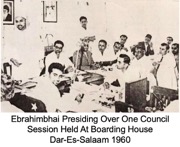
As The Chairman Of The Supreme Council
During this period, he restored the confidence of the Supreme Council. He almost retired from business to be able to serve the community. The first thing he did was to travel around East Africa from village to village and town to town and visited all the Jamaats. This he made to make himself familiar and understand their problems. He also travelled in order to raise Foundation Fund. They had no money to offer scholarship. People did not have confidence in council.
Collecting money was a hard job. These days people are making a lot of money. In those days it was not so. There were very few well wishers, who would offer scholarships.
He advised people that we should pool our resources. He got permission from Marja-e-Taqlid to build mosque and Imamwara. He did this out of Khums money. He found out that we could utilize this money with permission. Lots of changes have taken place with time. He created a name for the community.
No Computers Or Telex
In those days, there was a lot of table work. Typing was there, and there was nothing like computers or telex. Weight notes were prepared and checked. We made telephone calls at night with brokers in Mombasa, and studied the market.
Foreign coded cables were also being used. Today we have lost touch with our old clients. Men have changed. The government have made a mess of it all. They want to restore the past activities. By now, we ourselves have diversified. All those who had the background of export have died with exception of myself. The only export we have is coffee.
I attended the Council meeting in Arusha, Moshi and Dar es Salaam at the boarding house. Ebrahimbhai was sensitive and very serious in his deliberation, lest he lost the confidence of the people. That meant a very heavy strain on his mind.
At times he would go to bed and sleep and his Vice chairman would take over. In those days many people who came to the meeting were not educated. They would come with a bomb shell and criticize him. Ebrahimbhai had to face all that. Although it was done in good faith, the people were not accustomed to anything new that he was trying to implement. He was getting opposition from the traditionalist in Mombasa and Dar es Salaam. But this much is certain that he enjoyed lots of confidence of people upcountry.
Recruiting Of Maulanas
Gradually, he had a good foundation and controlled the recruiting of Maulanas so that there was no exploitation. That upset those who were going round begging money. The Maulanas were under the control of Council. Collection of funds, the centralization of khums and other activities under one umbrella meant a revolution on the structure of our religious body. Besides this, we went into public companies for the community through buying of the estates and investigating about the industries that could be established into Tanzania after Uhuru in 1961. So all that meant a heavy strain and finally he suffered a heart attack.
Everything depended on his decision, he was taking things very seriously. He was trying to delegate the authority to others. From business point of view, the younger generation were carrying on. Marhum Yusufbhai in Arusha and myself in Moshi. The community affairs were at his disposal. It was a question of prestige and dignity. I remember once there was a propaganda in Zanzibar against him that he was not caring for the poor. He flew specially from Mwanza in order to satisfy the complain of the trustees of the time, a big man who had written to him, one of the trouble mongers. He flew in order to satisfy him. This shows how serious he was.
But overall the community had so much trust in him that when the public company was floated, people were sending in their cheques for investment. All the three public companies he had established faced problems of government interference, yet they survived. It meant income for the community.
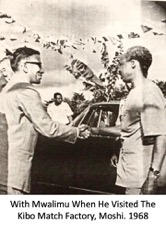
In Moshi
Moshi people had been very good with us. They were very generous, very entertaining and hospitable. It would be very wrong on my part to generalize and abuse them. They warmly welcomed my transfer to Moshi. They were entertaining me and helping me in many respect. They were hyperactive and aggressive. So if you hear of any hot arguments or anything like that, we should understand that they were very active people. Possibly because of Mt. Kilimanjaro water. No doubt, for us to adjust and fit in, it was quite a tough time for me. My last 7 years were as President of the Jamaat.
But in the course of these 18 years that I spent, we could see the beautiful mosque built, the Imamwara, the Musafarkhana and the Maddressa costing in the region of TShs.400,000/-. All that was possible because of the cooperation of the people, in supervising and raising funds, we all contributed together. Your father (interviewer's father) was instrumental in pushing to decide for it. He said "You have a club. Why not a mosque?" Luckily the plot was secured, which was very well situated in the centre of the town. The whole complex was supervised and built by Moshi people.
To Mombasa
I migrated with due consent of all my brothers. Not all of us could stay in Tanzania. Some of us could go out and find another place, possibly Karachi. But when I reached Kenya I said, we have licence there to trade both coffee and ivory in Kenya. So why not make use of associate firm there and do something.
The blessing of brothers was there and you could open your office. God wished and we were quite successful between 1970 and 1980. Business was on smaller scale. I was alone but at least the education problem was being looked after in Mombasa and Karachi.
Mohamedbhai spent a good time caring for so many children on one hand and the old trade on the other. He was worried about the expenses and the migration. He too realized that life was not bearable in Zanzibar and particularly under Karume. Then he decided to migrate within 10 to 15 days of giving a thought. That was a very bold step indeed.
Our Old House In Zanzibar
The old house in Zanzibar is dated 1866. Dewji Jamaal bought it for 2 to 3 thousand rupees. I have got a document with me in Mombasa, a historical document of over 100 years old. I have preserved it. The date is 1867. The house was Nationalized in 1967 under Karume. Then the situation in Zanzibar was very bad.
It took me 3 years to forget Zanzibar. I was crying. It is not easy to go back to Zanzibar. Wherever you go, Uganda, Kenya or Canada you will remember the easy life of Arusha. You go out only when you are forced or deported. The wise thing to do is to stay at one place and not spend lavishly. Save money, partly here and partly outside if possible.
Languages
I learnt Elementary books in Urdu and Farsi. But then because of Majlis and because of my interest in reading Islamic literature, I learnt these languages a lot more. I think all of you have to read books and refer to a dictionary. I read Persian books and write in my own language.
